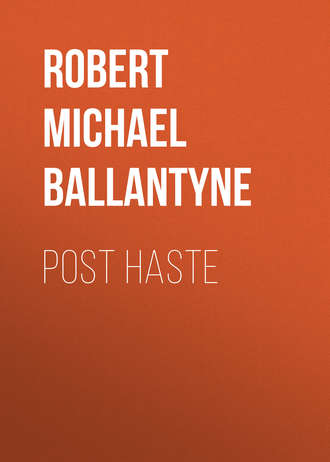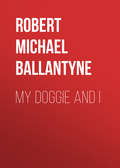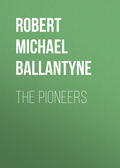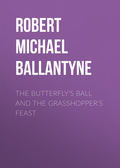
Robert Michael Ballantyne
Post Haste
Chapter Fifteen.
George Aspel Receives Various Visitors at the Ornithological Shop, and is Called to Vigorous Action
As long as a man retains a scrap of self-respect, and struggles, from any motive whatever, against his evil tendencies, his journey to destruction is comparatively slow; but when once he gives way to despair, assumes that he has tried his best in vain, and throws the reins on the neck of his passions, his descent into the dark abyss is terribly rapid.
For a time George Aspel was buoyed up by hope. He hoped that May Maylands might yet come to regard him with favour, though she studiously avoided giving him ground for such hope. He also continued, though faintly, to hope that Sir James Clubley might still think of fulfilling his promises, and, in pursuance of that hope, frequently inquired whether any letters had been left for him at the hotel where he first put up on arriving in London. But, when both of these hopes forsook him, and he found himself in what he deemed the ridiculous position of shopman to a bird-stuffer, without an influential friend in the great city, or the slightest prospect of improving his condition, he gave way to despair.
Before quite giving way, however, he made several attempts to obtain work more suited to his tastes and acquirements, in which efforts he was heartily seconded by Mr Enoch Blurt; but Enoch was about as unknown in London as himself, so that their united efforts failed.
In these circumstances the ambitious youth began to regard himself as a martyr to misfortune, and resolved to enjoy himself as he best might. With a view to this he spent his evenings in places of amusement, with companions whose example and influence helped to drag him down and increase his tendency to drink.
This tendency was in part hereditary. His father had been a confirmed drinker. Although well aware of this, he did not believe in his own fallibility. Few young men of his stamp do. Other men might give way to it, but there was no fear of him. He admitted that he could, and sometimes did, take a stiff glass of grog—but what then? It did him no harm. He was not a slave to it. He could give it up and do without it if he chose—although, it is to be remarked, he had never made the trial, and only assumed this power. To be rather “screwed” now and then was, he admitted, somewhat discreditable; but he wasn’t worse than many others, and it didn’t occur often. Thus he reasoned, half-justifying himself in a thoroughly selfish, sinful course; growling at his “bad luck,” and charging the guilt of his sin, which he said he couldn’t help, on Fate—in other words, on God.
It never occurred to George Aspel that the true way to get out of his troubles was to commit his way to his Maker; to accept the position assigned him; to do the work of a faithful servant therein; to get connected with good society through the medium of churches and young men’s Christian associations, and to spend a few years in establishing a character for trustworthiness, capacity, vigour, and intelligence, which would secure his advancement in life. At least, if such thoughts did occur to him, he refused to entertain them, and resolved to fling care to the dogs and defy fortune.
Of course, it soon became apparent to his employer that there was a great change for the worse in the youth, whom he not only admired for his frank bearing and strapping appearance, but loved as his deliverer from death. Delicacy of feeling, however, prevented Mr Blurt from alluding to dissipations at which he could only guess.
Poverty and distress bring about strange companionships. When Aspel first arrived in London he would have scouted the idea of his having anything whatever to do with such a man as Abel Bones, but he had not proceeded far in his downward course when that disreputable character became, if not a companion, at least an acquaintance.
This state of things was brought about primarily by the patronage which Aspel had extended to the “poor worthless fellow” whom he had so unceremoniously knocked down. But the poor worthless fellow, although born in a lower rank of life, was quite equal to him in natural mental power, and much superior in cunning and villainy. Mr Bones had also a bold, reckless air and nature, which were attractive to this descendant of the sea-kings. Moreover, he possessed a power of mingling flattery with humbug in a way that made his victim fall rather easily into his toils.
Revenge, as we have said, lay at the bottom of Abel Bones’ desire to become better acquainted with Aspel, but profit soon took the place of revenge. Mr Bones earned his livelihood chiefly by appropriating what belonged to other people. He was not particular as to what he took, or how he took it, but on the whole preferred easy work (like most people) and large profit. Being a man of bold, ambitious views, he had often thought of forgery, but a neglected education stood in the way of that. Being also a man of resource, he did not doubt that this, like many other difficulties, would ere long succumb to his perseverance. While in this frame of mind it occurred to him that he might make a tool of his new acquaintance and would-be patron. At the same time he had penetration enough to perceive that his intended tool was a dangerous instrument, highly-tempered and sharp-set, with a will of its own, not yet quite demoralised, and not by any means to be played with.
It might be tedious to trace the steps and winding ways by which Abel Bones led his victim from one piece of impropriety to another—always concealing his real character, and playing the rôle of an unfortunate man, willing to work, but unable to find employment—until he almost had him in his toils.
“It’s of no use your dancing attendance on me any longer, Bones,” said Aspel one day, as the former appeared at the door of the ornithological shop. “I have all the will to help you, but I have not the power. My friends have failed me, and I can do no more than keep my own soul in my body. You must look to some one else with more influence than I possess.”
“That’s a bad job, sir,” returned Bones, with a downcast look. “I’ve bin down at the docks all day, an’ earned only enough to get a plate of bacon and beans. Surely there’s somethin’ wrong when a cove that’s willin’ to work must starve; and there’s my wife and child starvin’ too. Seems to me that a cove is justified in stealin’ in the circumstances.”
He cast a sidelong glance at Aspel. It was the first time he had ventured to suggest dishonest intentions. If they should be taken ill, he could turn it off as a jest; if taken well, he could proceed.
“I’m very sorry for you, Bones,” said Aspel, not noticing the hint, “very sorry, but what can I do? I have not a copper left beyond what I absolutely require.”
“Well, sir, I know that you can do nothing, but now that my wife and child are actually starvin’, I really don’t see the sin of helpin’ myself to a loaf at the nearest baker’s, and giving him leg-bail for it.”
“Nothing justifies stealing,” said Aspel.
“D’ee think not, sir?” said Bones. “If you saw your wife now, supposin’ you had one, at the pint of death with hunger, an’ you saw a loaf lyin’ as didn’t belong to you, would you let her die?”
Aspel thought of May Maylands.
“I don’t know,” he replied, “what I should do. All that I say is, that stealing is unjustifiable.”
The argument was stopped at this point by the entrance of a small telegraph message-boy.
Bones was startled by his sudden entrance.
“Well, good-night, sir, we’ll talk that matter over some other time,” he said quickly, pulling his wideawake well over his face as he went out, and giving the message-boy a prolonged stare.
The boy paid no regard to him, but, turning to Aspel, introduced himself as Peter Pax.
“What! the comrade-in-arms of my friend Phil Maylands?” asked Aspel.
“The same, at your service,” replied the small messenger; “an’ if you are the friend he talks to me so much about, as goes by the name of George Aspel, an’ is descended in a direct line from the old sea-kings, I’m proud to make your acquaintance.”
Aspel laughed at the consummate self-possession of the boy, and shaking hands with him heartily as a comrade of their common friend Phil, bade him take a seat, which he immediately did on the counter.
“You’re surrounded by pleasant company here,” observed Pax, gazing intently at the pelican of the wilderness.
“Well, yes; but it’s rather silent company,” said Aspel.
“Did that fellow, now,” continued Pax, pointing to the owl, “die of surprise?”
“Perhaps he did, but I wasn’t present at his death,” returned the other.
“Well, now, I do like this sort o’ thing.”
Little Pax said this with such genuine feeling, and looked round him with such obvious interest, that Aspel, with some surprise, asked him why he liked it.
“Why? because from my earliest years I always was fond of animals. No matter what sort they wos, I liked ’em all—birds an’ beasts an’ fishes, flyers and creepers, an’ squeakers and flutterers,” said the boy, clasping both hands over one knee, and rocking himself to and fro on the counter, while he gazed into the owl’s face with the air of one whose mind is rambling far away into the remote past.
“Once on a time,” he continued, sadly, “I dwelt in the country. I was born in the country. I’m a sort o’ country gentleman by nature, so to speak, and would have bin revellin’ in the country to this day if a perwerse fate hadn’t driven me into the town—a very perwerse fate indeed.”
“Indeed?” said Aspel, unable to restrain a laugh at his visitor’s old-fashioned ways, “what sort of fate was it?”
“A perwerse one, didn’t I tell you?”
“Yes, but wherein consisted its perversity? How did it act, you know?”
“Ah, its perwersity consisted in drivin’ me into town in a market-cart,” said Pax. “You must know that my perwerse fate was a uncle. He was a big brute. I don’t mean to speak of ’im disrespectfully. I merely give ’im his proper name. He was a market-gardener and kept cows—also a pump. He had a wife and child—a little girl. Ah! a sweet child it was.”
“Indeed,” said Aspel, as the boy relapsed into a silent contemplative gaze at the pelican.
“Yes,” resumed Pax, with a sigh, “it was a child, that was. Her name was Mariar, but we called ’er Merry. Her father’s name—the Brute’s, you know—was Blackadder, and a blacker adder don’t wriggle its slimy way through filthy slums nowhere—supposin’ him to be yet unscragged, for he was uncommon hard on his wife—that’s my Aunt Georgie. Her name was Georgianna. I wonder how it is that people never give people their right names! Well, Mr Aspel, you must know I was nuss to baby. An amytoor nuss I was—got no pay for it, but a considerable allowance o’ kicks from the Brute, who wasn’t fond o’ me, as I’d done ’im a mortal injury, somehow, by being his defunct brother’s orphan child. You understand?”
George Aspel having professed a thorough comprehension of these family relationships, little Pax went on.
“Well then, bein’ nuss to Merry, I used to take ’er out long walks in the fields among the flowers, an’ I was used to catch butterflies and beetles for ’er, an’ brought ’em home an’ stuck pins through ’em an’ made c’lections; an’ oh, I did like to scuttle about the green lanes an’ chase the cows, an’ roll on the grass in the sunshine with Merry, an’ tear an bu’st my trousers, for w’ich I got spanked by the Brute, but didn’t care a rap, because that brought me double allowance o’ coddlin’ from Aunt Georgie. One day the Brute drove me into town in the market-cart; set me down in the middle of a street, and drove away, an’ I haven’t seen him, nor Aunt Georgie, nor Merry from that day to this.”
“Dear me!” exclaimed George Aspel, rather shocked at this sudden and unexpected termination of the narrative; “do you mean to say—”
“It strikes me,” interrupted Pax, looking pointedly at the door, “that you’ve got another visitor.”
Aspel turned and saw the dishevelled curls and pretty face of Tottie Bones in the doorway.
“Please, sir,” she said, entering, “I didn’t like to interrupt you, but Miss Lillycrop sent me to say that there was a strange smell of singein’ in the ’ouse, an’ would Mr Aspel be so kind as to come and try to find out where it was, as she didn’t understand such things.”
“Smell of singeing, child!” exclaimed Aspel, rising at once and putting on his coat and hat. “Did you search for the cause, especially about your kitchen fireplace?”
“O yes, sir,” exclaimed Tottie, “an’ we couldn’t see no cause at all—only the flue seemed to be ’otter than usual. We looked all over the ’ouse too, but couldn’t see nothink—but we could feel a most drefful smell.”
Desiring Mrs Murridge to call Mr Blurt to attend to the shop, George Aspel hurried out.
“Don’t try to keep up with us,” said Aspel to Tottie; “I must run. It may be fire!”
“Oh! please, sir, don’t leave me behind,” pleaded the child.
“All right—we won’t; kitch hold of my hand; give the other to Mr Aspel,” said Peter Pax.
Holding on to her two friends, Tottie was swept along the streets at a rate which she had never before experienced—at least not as a foot-passenger,—and in a few minutes they were in Miss Lillycrop’s dwelling.
That excellent lady was in a state of dreadful perturbation, as well she might be, for the house was filled with a thin smoke of very peculiar odour.
Few persons except the initiated are fully alive to the immense importance of checking fire at its commencement. The smoke, although not dense enough to attract the attention of people outside, was sufficiently so to make those inside commence an anxious search, when they should have sent at once for the fire-engine.
Three families occupied the tenement. Miss Lillycrop’s portion was at the top. A dealer in oils and stores of a miscellaneous and unsavoury kind occupied the basement.
George Aspel at once suspected and made for this point, followed by Miss Lillycrop, who bade Tottie remain in her kitchen, with the intention of keeping her at once out of danger and out of the way.
“There’s certainly fire somewhere, Pax; run, call the engines out,” said Aspel, descending three steps at a time.
Pax took the last six steps at a bound, and rushed along the street, overturning in his flight two boys bigger than himself, and a wheelbarrow.
The owner of the cellars was absent and his door locked. Where was the key? No one knew, but George Aspel knew of a key that had done some service in times past. He retreated a few steps, and, rushing at the door with all his weight and momentum, dashed it in with a tremendous crash, and went headlong into the cellar, from out of which came belching flames and smoke. Re-issuing instantly therefrom with singed hair and glaring eyes, he found Miss Lillycrop lying on her back in a faint, where the fire and smoke had floored her. To gather her up and dash into the street was the work of a moment. Scarcely less rapid was the rush of the fire, which, having been richly fed and long pent up in the cellar, now dashed up the staircases like a giant refreshed.
Meanwhile little Pax ran headlong into a policeman, and was collared and throttled.
“Now then, young ’un!”
“Fire! station!” gasped Pax.
“All right, this way—just round the corner,” said the man in blue, releasing his captive, and running along with him; but the man in blue was stout, middle-aged, and heavy. Pax outran him, saw the red lamp, found the fire-station door open, and leaped through with a yell of “Fire!” that nearly split his little lungs.
The personification of calmness in the form of a fireman rose and demanded “Where?”
Before Pax could gasp the address, two other personifications of calmness, who had been snoring on trestle-beds, dressed and booted, when he entered, now moved swiftly out, axed and helmeted. There was a clattering of hoofs outside. The double doors flew open, and the red engine rolled out almost of its own accord. More brass helmets were seen flashing outside.
“Are you sure of the address, youngster?” asked one of the imperturbable firemen, settling his chinstrap more comfortably.
“Are you sure o’ your own grandmother?” said Pax.
“You’re cheeky,” replied the man, with a smile.
“You make haste,” retorted Pax; “three minutes allowed to get under weigh. Two and a half gone already. Two-and-six fine if late, besides a—”
The whip cracked, and Pax, leaping forward, seized the side of the engine. Six brass helmets bounded into the air, and their owners settled on their seats, as the horses made that momentary pause and semi-rear which often precedes a dashing start. The man whom he had been insulting held out a hand; Pax seized it, and was next moment in a terrestrial heaven, while calmness personified sauntered into the back office to make a note of the circumstance, and resume his pipe.
Oh! it was a brief but maddening ride. To experience such a magnificent rush seemed to Pax worth living for. It was not more than half-a-mile; but in that brief space there were three corners to turn like zigzag lightning, which they did chiefly on the two near wheels, and there were carts, vans, cabs, drays, apple-stalls, children, dogs, and cats innumerable. To have run over or upset these would have been small gratification to the comparatively tender spirit of Pax, but to shave them; to graze the apple-stalls; to just scrape a lamp-post with your heart in your mouth; to hear the tremendous roar of the firemen; to see the abject terror of some people, the excitement of others, the obedient “skedaddling” of all, while the sparks from the pump-boiler trailed behind, and the two bull’s-eyes glared ahead, so that the engine resembled some awful monster rushing through thick and thin, and waving in triumph its fiery tail—ah! words are but feeble exponents of thought: it was excruciating ecstasy! To have been born for this one burst, and died, would have been better than never to have been born at all,—in the estimation of the enthusiastic Peter Pax!
A few minutes after George Aspel had borne the fainting Miss Lillycrop from the house the engine arrived. Some of the men swarmed into the house, and dived to the basement, as if fire and smoke were their natural food. Others got the engine to work in a few seconds, but already the flames had rushed into the lower rooms and passages and licked away the windows. The thick stream of water had just begun to descend on the fire, when another engine came rattling to the field, and its brazen-headed warriors leaped down to join the battle.
“Oh!” groaned Miss Lillycrop at that moment, recovering in Aspel’s arms. “Oh! Tottie—To-o-o-o-tie’s in the kitchen!”
Little Pax heard and understood. In one moment he bounded through the blazing doorway and up the smoking stair.
Just then the fire-escape came into view, towering up against the black sky.
“Hold her, some one!” cried Aspel, dropping his poor burden into the ready arms of a policeman.
“The boy’s lost!” he exclaimed, leaping after Pax.
Aspel was a practised diver. Many a time had he tried his powers under the Atlantic waves on the west of Ireland. He drew one long breath, and was in the attic kitchen before it was expended. Here he found little Pax and Tottie on the floor. The former had fallen, suffocated, in the act of hauling the latter along by the hair of the head. Aspel did not see them. He stumbled over them, grasped both in his strong arms, and bore them to the staircase. It was by that time a roaring furnace. His power of retaining breath was exhausted. In desperation he turned sharp to the right, and dashed in Miss Lillycrop’s drawing-room door, just as the fire-escape performed the same feat on one of the windows. The gush of air drove back the smoke for one moment. Gasping and reeling to the window, Aspel hurled the children into the bag of the escape. He retained sufficient power to plunge in head first after them and ram them down its throat. All three arrived at the bottom in a state of insensibility.
In this state they were borne to a neighbouring house, and soon restored to consciousness.
The firemen battled there during the greater part of that night, and finally gained the victory; but, before this happy consummation was attained, poor Miss Lillycrop’s home was gutted and her little property reduced to ashes.
In these circumstances she and her little maid found a friend in need in Miss Stivergill, and an asylum in Rosebud Cottage.







